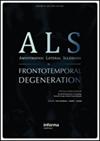Twelve-month duration as an appropriate criterion for flail arm syndrome
IF 2.8
4区 医学
Q2 CLINICAL NEUROLOGY
Amyotrophic Lateral Sclerosis and Frontotemporal Degeneration
Pub Date : 2020-01-02
DOI:10.1080/21678421.2019.1663872
引用次数: 5
Abstract
Abstract Objectives: To analyze the clinical features of flail arm syndrome (FAS) in a large Chinese clinic-based cohort, and to discuss whether it is proper to use a course of 12 months from symptoms onset as the criterion for FAS. Methods: This cohort study included patients with FAS or upper-limb-onset amyotrophic lateral sclerosis (UL-ALS) who visited Peking University Third Hospital between 2003 and 2013. Patients with FAS were diagnosed according to Wijesekera’s definition, and patients fulfilling all the diagnostic criteria of FAS except that the course of disease was less than 12 months were defined as “FAS-type ALS”. Group differences were analyzed using parametric and nonparametric tests as appropriate. Survival was analyzed using the Kaplan–Meier method and a Cox regression model. Results: One thousand nine hundred and thirty-five patients with ALS were recruited in the database, including 131 patients with FAS or FAS-type ALS and 767 with UL-ALS. The prognosis of FAS was significantly better than that of UL-ALS (p = 0.024) and FAS-type ALS (p < 0.0005), and the survival of patients with FAS-type ALS was worse than that of UL-ALS (p = 0.002). The difference in survival between those with proximal FAS (pFAS) and distal FAS (dFAS) (p = 0.188) was not significant. Conclusion: Since the prognosis of FAS-type ALS was significantly worse than that of FAS, our data suggest that a FAS subphenotype can be established after 12 months from first symptoms. It is important to note that FAS-type ALS phenotype may carry a worse prognosis than that of patients with UL-ALS.12个月持续时间作为连枷臂综合征的适当标准
目的:分析连枷臂综合征(flail - arm syndrome, FAS)的临床特征,探讨以症状出现后12个月的病程作为FAS的诊断标准是否合适。方法:本队列研究纳入2003 - 2013年在北京大学第三医院就诊的FAS或上肢肌萎缩性侧索硬化症(UL-ALS)患者。FAS患者按照Wijesekera的定义进行诊断,除病程少于12个月外,满足FAS所有诊断标准的患者定义为“FAS型ALS”。采用参数检验和非参数检验分析组间差异。生存率分析采用Kaplan-Meier法和Cox回归模型。结果:数据库中招募了1335例ALS患者,其中FAS或FAS型ALS患者131例,UL-ALS患者767例。FAS的预后明显优于UL-ALS (p = 0.024)和FAS型ALS (p < 0.0005), FAS型ALS患者的生存期较UL-ALS患者差(p = 0.002)。近端FAS (pFAS)与远端FAS (dFAS)患者的生存率差异无统计学意义(p = 0.188)。结论:由于FAS型ALS的预后明显差于FAS,我们的数据表明,FAS亚表型可以在首次出现症状后12个月建立。值得注意的是,fas型ALS表型可能比UL-ALS患者预后更差。
本文章由计算机程序翻译,如有差异,请以英文原文为准。
求助全文
约1分钟内获得全文
求助全文
来源期刊

Amyotrophic Lateral Sclerosis and Frontotemporal Degeneration
CLINICAL NEUROLOGY-
CiteScore
5.40
自引率
10.70%
发文量
64
期刊介绍:
Amyotrophic Lateral Sclerosis and Frontotemporal Degeneration is an exciting new initiative. It represents a timely expansion of the journal Amyotrophic Lateral Sclerosis in response to the clinical, imaging pathological and genetic overlap between ALS and frontotemporal dementia. The expanded journal provides outstanding coverage of research in a wide range of issues related to motor neuron diseases, especially ALS (Lou Gehrig’s disease) and cognitive decline associated with frontotemporal degeneration. The journal also covers related disorders of the neuroaxis when relevant to these core conditions.
 求助内容:
求助内容: 应助结果提醒方式:
应助结果提醒方式:


